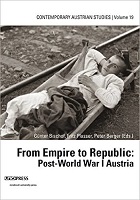From Empire to Republic: Post-World War I Austria
| dc.contributor.author | Berger, Peter | |
| dc.contributor.author | Bischof, Günter | |
| dc.contributor.author | Plasser, Fritz | |
| dc.date.accessioned | 2013-07-10 00:00:00 | |
| dc.date.accessioned | 2020-04-01T14:59:26Z | |
| dc.date.available | 2020-04-01T14:59:26Z | |
| dc.date.issued | 2010 | |
| dc.identifier | 449474 | |
| dc.identifier | OCN: 1030813884 | en_US |
| dc.identifier.uri | http://library.oapen.org/handle/20.500.12657/33879 | |
| dc.description.abstract | After the dissolution of the Austro-Hungarian Monarchy, Austria transformed itself from an empire to a small Central European country. Formerly an important player in international affairs, the new republic was quickly sidelined by the European concert of powers. The enormous losses of territory and population in Austria’s post-Habsburg state of existence, however, did not result in a political, economic, cultural, and intellectual black hole. The essays in the twentieth anniversary volume of Contemporary Austrian Studies argue that the small Austrian nation found its place in the global arena of the twentieth century and made a mark both on Europe and the world. Be it Freudian psychoanalysis, the “fin-de-siècle” Vienna culture of modernism, Austro-Marxist thought, or the Austrian School of Economics, Austrian hinkers and ideas were still wielding a notable impact on the world. Alongside these cultural and intellectual dimensions, Vienna remained the Austrian capital and reasserted its strong position in Central European and international business and finance. Innovative Austrian companies are operating all over the globe. This volume also examines how the globalizing world of the twentieth century has impacted Austrian demography, society, and political life. Austria’s place in the contemporary world is increasingly determined by the forces of the European integration process. European Union membership brings about convergence and a regional orientation with ramifications for Austria’s global role. Austria emerges in the essays of this volume as a highly globalized country with an economy, society, and political culture deeply grounded in Europe. The globalization of Austria, it appears, turns out to be in many instances an “Europeanization.” | |
| dc.language | English | |
| dc.relation.ispartofseries | Contemporary Austrian Studies | |
| dc.subject.classification | thema EDItEUR::N History and Archaeology::NH History::NHT History: specific events and topics::NHTB Social and cultural history | en_US |
| dc.subject.classification | thema EDItEUR::N History and Archaeology::NH History::NHW Military history::NHWR Specific wars and campaigns::NHWR5 First World War | en_US |
| dc.subject.classification | thema EDItEUR::3 Time period qualifiers::3M c 1500 onwards to present day::3MP 20th century, c 1900 to c 1999::3MPB Early 20th century c 1900 to c 1950::3MPBF c 1910 to c 1919::3MPBFB c 1914 to c 1918 (World War One period) | en_US |
| dc.subject.other | post-world war i | |
| dc.subject.other | austria | |
| dc.subject.other | Vienna | |
| dc.title | From Empire to Republic: Post-World War I Austria | |
| dc.type | book | |
| oapen.abstract.otherlanguage | Der Zerfall der Österreichisch-Ungarischen Monarchie hatte zur Folge, dass die einstige Großmacht der Habsburger zu einem Kleinstaat im Herzen Europa wurde. Der enorme Verlust an Territorium und die Verringerung der Bevölkerung hinterließ allerdings keineswegs ein politisches, wirtschaftliches, kulturelles oder intellektuelles Vakuum. Die Aufsätze des 20. Jubiläumsbandes der Contemporary Austrian Studies zeigen vielmehr, dass die Republik Österreich ihren Platz in Europa und der Welt halten konnte: Sei es die Psychoanalyse von Freud, das Wien des fin-de-siècle oder der Austro-Marxismus, österreichische Ideen fanden weltweit Anklang. Auch in der internationalen Geschäfts- und Finanzwelt konnte sich Wien als Hauptstadt behaupten. Heute bestimmen der EU-Beitritt, der europäische Integrationsprozess sowie die Globalisierung das wirtschaftliche, gesellschaftliche und politische Leben Österreichs. | |
| oapen.identifier.doi | 10.26530/OAPEN_449474 | |
| oapen.relation.isPublishedBy | 0072b05d-aad9-4688-8e4a-1ddfe9370b7d | |
| oapen.relation.isbn | 9781608010257 | |
| oapen.collection | AG Universitätsverlage | |
| oapen.series.number | 19 | |
| oapen.pages | 448 | |
| oapen.remark.public | Relevant Wikipedia pages: Austria - https://en.wikipedia.org/wiki/Austria; Austrian Empire - https://en.wikipedia.org/wiki/Austrian_Empire; Vienna - https://en.wikipedia.org/wiki/Vienna | |
| oapen.identifier.ocn | 1030813884 |

